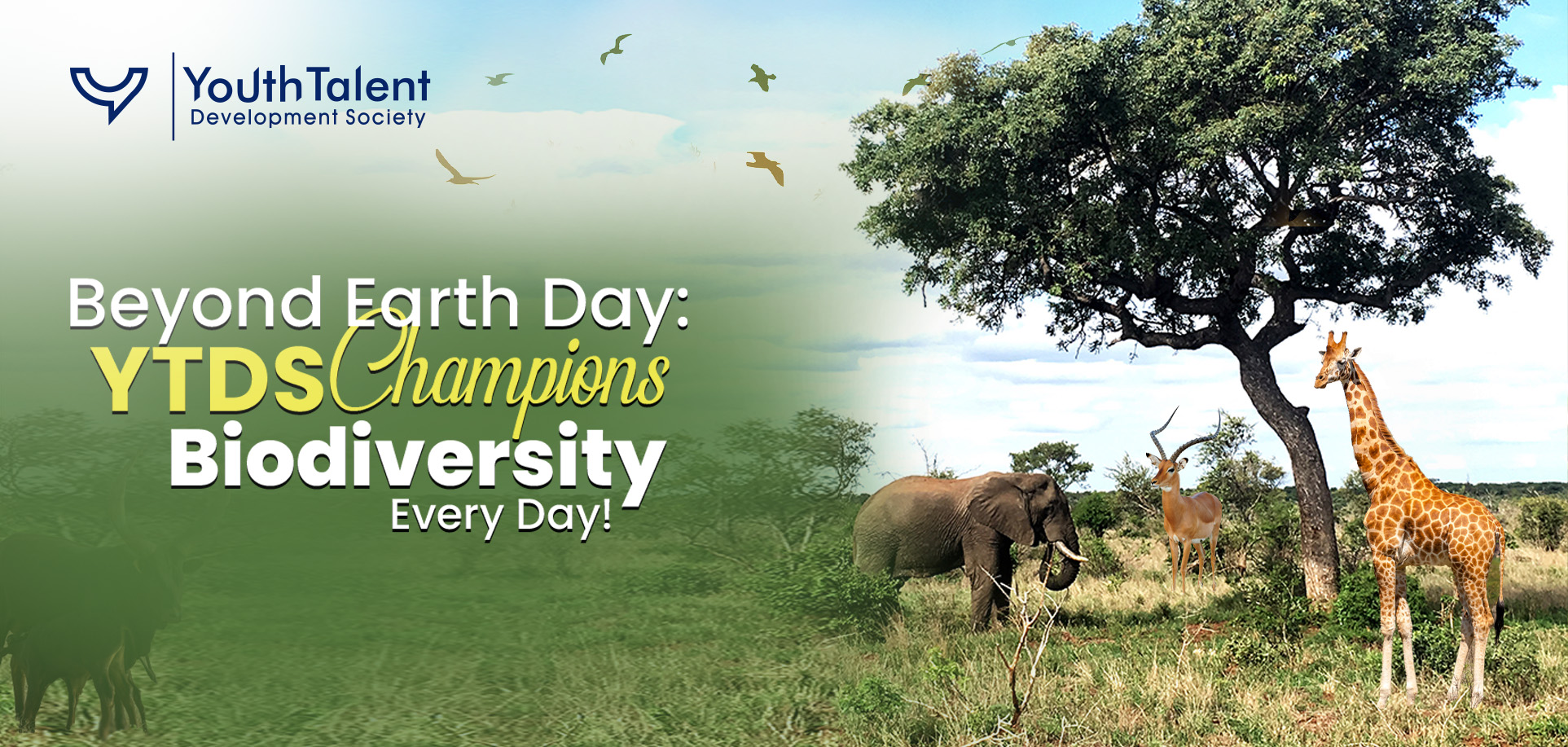
Beyond Earth Day: YTDS Champions Biodiversity Every Day!
Every May 22, the world gathers to mark the International Biodiversity Day as a day set aside for acknowledging the significance of biodiversity while urging measures for preservation of the same. This year's theme is “Our Biodiversity, Our Food, Our Health” which underscores the indispensable contribution that biodiversity makes towards supporting life on earth This day is therefore a poignant reminder to all humanity about their obligation in ensuring that our planet remains rich in its biological diversity of different forms of life and their habitat.
Biodiversity Unveiled: Why Every Species Counts
Biodiversity is a term used to describe the wide range of life forms found on Earth. It includes different species, habitats and genetic diversity found among them at present times It is important for ecosystems that maintain human health to have strong biodiversity . The production of populations and ecosystems is affected by all life forms; something that ensures that they remain stable in their environment. Biodiversity may have a wide range of positive effects on people. The availability of food, medicine, and raw materials from it is one of its most significant advantages. It can also help in purifying water and maintaining air quality. In short, biodiversity is the basis for human societies as well as nature.
Perils to Our Planet: The Battle for Biodiversity
Despite the immense significance that biodiversity has, it is under serious threat from various quarters. The gravest one among all is the loss of habitats because of urbanisation, agriculture, or deforestation. Chemicals, plastic wastes or industrial pollutants make the air unsafe; similarly water and soil. As global warming forces animals to migrate, adapt or extinct entirely due to habitat loss it causes by changing temperatures all over the world.Invasive species also heighten ecosystem instability by superceding endemic species. Such compounded dangers has caused previously unrecorded rates of extinction for species and environmental decline.
YTDS: Embracing the Wisdom of Nature
YTDS, an organization that is fully committed to environmental conservation, says that appreciation of and understanding the environment are indispensable for continued growth. The preservation of biodiversity is the main principle that YTDS (The Youth Training and Development Society) aligns itself with in regards to environment, education, employment, as well as empowerment.YTDS empowers societies to participate actively in realizing a greener future by educating children on environmental matters and creating employment chances in conservation. Through a holistic method, we can assure that the succeeding generations grow up with consideration for the environment.
Walking with Nature: YTDS’s Impactful Journey
The #PlantAMillionTrees campaign is responsible for rallying people across India to plant and nurture trees while YTDS has led numerous efforts aimed at promoting environmental literacy and conservation over the years. Approximately 45,000 trees have been successfully planted in this program with no tree having died in the process, therefore indicating the sustainability of YTDS. The local authorities, communities and NGOs have entered into alliances which have highly contributed towards creation of green areas as well as reclaiming destroyed land by YTDS. Another significant effort is the partnership with Sankalp Pratishthan and Mahiti Seva Samiti on tree planting campaigns on Bakori Hills. The assistance of more than 80 volunteers helped plant over 4,000 trees showing how communities together with individuals can make environmental conservation successful. The aim is to enhance coexistence among different species hence increasing community attachment to nature.
Small Actions, Huge Differences: How YOU Can Honor Biodiversity Daily!
The preservation of biodiversity doesn’t need any highly noticeable actions; even small non-regular ones can still lead to quite significant results. Here are some simple things to help you celebrate the diversity of life on earth every day:
1. Plant Saplings - Trees provide the habitat for small animals, improve air quality and supply food for them thus benefiting the whole ecological community. Engage in community tree planting projects or start planting saplings on your compound.
2. Support trade in sustainable goods: buy items from green companies and from businesses which emphasize on products made from renewable sources.
3. Reducing waste, reusing items, and recycling materials are practices that can help to address the problem of garbage. The environment and natural resources will benefit from this approach.
4. Save the water, be smart- use it wisely, employ less water-consuming appliances, have quicker showers and repair the leaks.
5. When designing a backyard, there are different structures—walls; floors; ceilings; furniture—all which resemble those found in houses. In this case, hedges or fences represent walls; grass or paths serve as floors; trees provide for ceilings while plants make up for furniture. The kind of plants you want depends on the type of animals you would want around—or rather, “buzzing around”.
6. Teaching and championing: Increase the public's awareness of the importance of biodiversity and advocate for legal frameworks that protect natural sites.
Guardians of Biodiversity: Stories That Inspire
YTDS is motivated to keep up its work by a number of individuals and organizations which have significantly contributed to the conservation of biodiversity. One example of such a story is that of the Shaw Toyota volunteers who joined forces with YTDS in order to plant over 150 trees in Bakori Hill. The story of their dedication alongside hard work, offers a great example of how corporate social responsibility influences environmental sustainability. One more inspiring story is the individual tree planting project at Yerwada Police Station. Senior Police Inspector Mr. Balkrushna Kadam launched it and more than 50 trees were planted at the station to stress the station’s commitment to environmental conservation. This shows that many people are involved in saving our animal and plant species despite the type of job they do.
Vision for Tomorrow: Building a Sustainable Future Together
You need biodiversity to reach the goals of sustainable development. Preventing loss of biodiversity, stopping desertification, conserving terrestrial ecosystems, restoring them as well as encouraging the sustainable use are some of the principal objectives emphasized by SDG number 15, which is Better protection of life on land. They are crucial for the achievement of this. SDG 13 states the significance of fighting climate change and its effects. Trees help slow down the rate of planetary warming by taking in carbon (IV) oxide which is a major greenhouse gas. The major objective of SDG 11 is to have all-inclusive safe and resilient towns that will last for ages without being a danger zone for residents. Initiatives that focus on planting trees within cities are contributing towards this effort because it provides urban built-up spaces with favorable air quality, green parks and recreation grounds for people who live there. Also, no poverty and shallow hunger in SDGs 1 and 2 belong to the same spectrum as biodiversity. An agriculture and fishing industry in good condition helps many achieve food security and earn a living. We can only safeguard such crucial resources if their diversity is maintained thus lowering poverty levels and augmenting food availability.
Be the Change: Get Involved with YTDS Today
Your contribution is vital to the biodiversity conservationism. Go to the YTDS site and their social media pages for more on the programmes they have on biodiversity. Engage in tree planting exercises and other environmental activities as a volunteer. Support education initiatives, environment projects and tree planting exercises financially. Bring along your friends and family so they can help champion for the worth of biodiversity and the work going on at YTDS. This is possible by all of us coming together to promote Utali Young and talented and hence this will clear the way for a more sustainable and greener future. Future generations have a place of refuge on earth because every tree planted, all forms of sensitization take place and money is made in the process of protecting it from disappearing.


